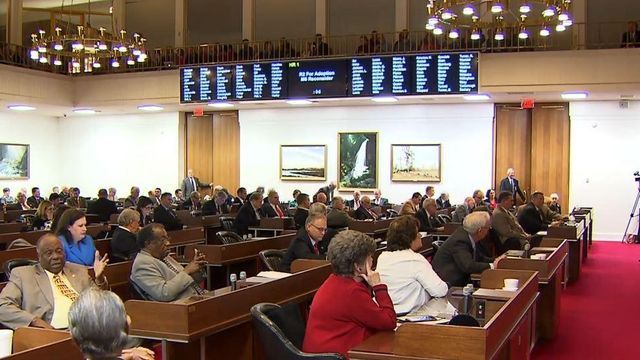Lawmakers poised to undercut Cooper, deliver boons to McCrory
Lawmakers have filed bills to change election laws, environmental regulations and school funding during a surprise special session. They also plan to confirm two new judges for the state's Business Court.
Posted — UpdatedTaken as a whole, many of the measures filed Wednesday night appear aimed at rewarding outgoing Republican Gov. Pat McCrory and hamstringing Democratic Gov.-elect Roy Cooper, although it's unclear exactly how many of those bills will pass before the session ends. Emblematic of that second set of bills is a measure that would require Senate confirmation of all Cooper appointments to be cabinet secretaries, something to which no other governor in recent memory has had to submit.
However, shortly after finishing substantive work on the disaster measure, House Speaker Tim Moore and Senate President Pro Tem Phil Berger announced lawmakers had called themselves into a separate, unrelated special session to handle unspecified matters.
"There's been a lot of speculation for several weeks, a lot of it wrong. I would prefer not to contribute to that," Berger, R-Rockingham, said when asked Wednesday afternoon for an outline of the latest special session's agenda.
Several of the measures filed Wednesday would reward McCrory before he leaves office at the end of the month.
Other measures finish work lawmakers left undone this summer. For example, a regulatory reform measure would cover everything from the sale of pet turtles to where motor vehicles need emission inspections.
"It appears this fourth special session will be to nullify the vote of the people for governor," House Minority Leader Larry Hall said.
Hall, D-Durham, compared the actions by lawmakers to the 1898 riots in Wilmington that overturned election results unpopular with white supremacists at the time.
One bill filed Wednesday would strip Cooper of his appointments to boards of trustees for University of North Carolina campuses, and the Senate would have to confirm all of Cooper's appointments to serve as cabinet secretaries. It also slices the number of political supervisory positions Cooper can hire and fire at will from 1,500, as has been the case under McCrory, to 300.
Another bill would merge the State Board of Elections and the Ethics Commission into a single eight-member body, splitting appointments evenly between Republican and Democratic members. Currently, members from the majority party hold a 3-2 advantage on the elections board. Local election boards would also be converted from three members to four members.
"This group will be a nonpartisan committee, because it will be completely balanced," said Sen. Bob Rucho, R-Mecklenburg.
The same measure would also change the Supreme Court from nonpartisan elections to partisan. Republicans have long felt that the nonpartisan races put their candidates at a disadvantage, a notion borne out by Democrat Mike Morgan's defeat of incumbent Justice Bob Edmunds this fall. The bill would also limit appeals of cases to the Supreme Court if they are first heard by all 15 Court of Appeals judges in an en banc panel, a procedure that is currently rarely used.
"Unconstitutional laws could be in effect for years before the state Supreme Court would finally get the case and rule," said Anita Earls, director of the Southern Coalition for Social Justice, which has successfully sued the state on a number of elections matters. "It also means that every case will be ruled on first by a majority of Republican judges. This further encourages more partisanship instead of fostering an impartial judiciary."
Earls also characterized the changes to the state Board of Elections as a "partisan power grab."
• Credits
Copyright 2024 by Capitol Broadcasting Company. All rights reserved. This material may not be published, broadcast, rewritten or redistributed.






